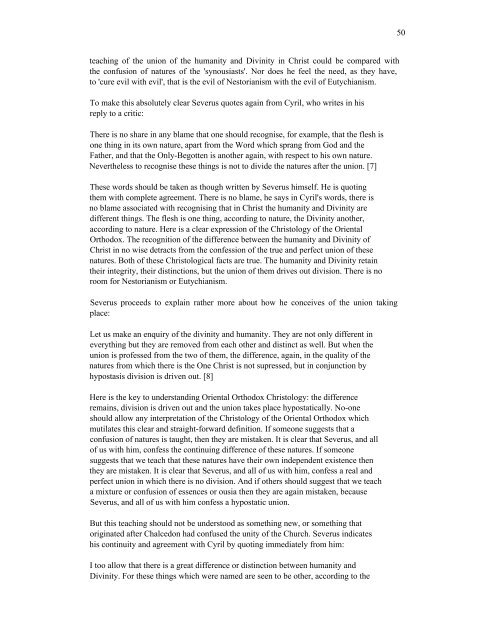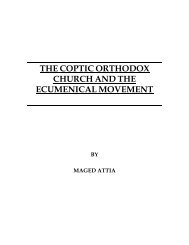Coptic interpretations of the Fourth Ecumenical Council - Saint Mina ...
Coptic interpretations of the Fourth Ecumenical Council - Saint Mina ...
Coptic interpretations of the Fourth Ecumenical Council - Saint Mina ...
Create successful ePaper yourself
Turn your PDF publications into a flip-book with our unique Google optimized e-Paper software.
teaching <strong>of</strong> <strong>the</strong> union <strong>of</strong> <strong>the</strong> humanity and Divinity in Christ could be compared with<br />
<strong>the</strong> confusion <strong>of</strong> natures <strong>of</strong> <strong>the</strong> 'synousiasts'. Nor does he feel <strong>the</strong> need, as <strong>the</strong>y have,<br />
to 'cure evil with evil', that is <strong>the</strong> evil <strong>of</strong> Nestorianism with <strong>the</strong> evil <strong>of</strong> Eutychianism.<br />
To make this absolutely clear Severus quotes again from Cyril, who writes in his<br />
reply to a critic:<br />
There is no share in any blame that one should recognise, for example, that <strong>the</strong> flesh is<br />
one thing in its own nature, apart from <strong>the</strong> Word which sprang from God and <strong>the</strong><br />
Fa<strong>the</strong>r, and that <strong>the</strong> Only-Begotten is ano<strong>the</strong>r again, with respect to his own nature.<br />
Never<strong>the</strong>less to recognise <strong>the</strong>se things is not to divide <strong>the</strong> natures after <strong>the</strong> union. [7]<br />
These words should be taken as though written by Severus himself. He is quoting<br />
<strong>the</strong>m with complete agreement. There is no blame, he says in Cyril's words, <strong>the</strong>re is<br />
no blame associated with recognising that in Christ <strong>the</strong> humanity and Divinity are<br />
different things. The flesh is one thing, according to nature, <strong>the</strong> Divinity ano<strong>the</strong>r,<br />
according to nature. Here is a clear expression <strong>of</strong> <strong>the</strong> Christology <strong>of</strong> <strong>the</strong> Oriental<br />
Orthodox. The recognition <strong>of</strong> <strong>the</strong> difference between <strong>the</strong> humanity and Divinity <strong>of</strong><br />
Christ in no wise detracts from <strong>the</strong> confession <strong>of</strong> <strong>the</strong> true and perfect union <strong>of</strong> <strong>the</strong>se<br />
natures. Both <strong>of</strong> <strong>the</strong>se Christological facts are true. The humanity and Divinity retain<br />
<strong>the</strong>ir integrity, <strong>the</strong>ir distinctions, but <strong>the</strong> union <strong>of</strong> <strong>the</strong>m drives out division. There is no<br />
room for Nestorianism or Eutychianism.<br />
Severus proceeds to explain ra<strong>the</strong>r more about how he conceives <strong>of</strong> <strong>the</strong> union taking<br />
place:<br />
Let us make an enquiry <strong>of</strong> <strong>the</strong> divinity and humanity. They are not only different in<br />
everything but <strong>the</strong>y are removed from each o<strong>the</strong>r and distinct as well. But when <strong>the</strong><br />
union is pr<strong>of</strong>essed from <strong>the</strong> two <strong>of</strong> <strong>the</strong>m, <strong>the</strong> difference, again, in <strong>the</strong> quality <strong>of</strong> <strong>the</strong><br />
natures from which <strong>the</strong>re is <strong>the</strong> One Christ is not supressed, but in conjunction by<br />
hypostasis division is driven out. [8]<br />
Here is <strong>the</strong> key to understanding Oriental Orthodox Christology: <strong>the</strong> difference<br />
remains, division is driven out and <strong>the</strong> union takes place hypostatically. No-one<br />
should allow any interpretation <strong>of</strong> <strong>the</strong> Christology <strong>of</strong> <strong>the</strong> Oriental Orthodox which<br />
mutilates this clear and straight-forward definition. If someone suggests that a<br />
confusion <strong>of</strong> natures is taught, <strong>the</strong>n <strong>the</strong>y are mistaken. It is clear that Severus, and all<br />
<strong>of</strong> us with him, confess <strong>the</strong> continuing difference <strong>of</strong> <strong>the</strong>se natures. If someone<br />
suggests that we teach that <strong>the</strong>se natures have <strong>the</strong>ir own independent existence <strong>the</strong>n<br />
<strong>the</strong>y are mistaken. It is clear that Severus, and all <strong>of</strong> us with him, confess a real and<br />
perfect union in which <strong>the</strong>re is no division. And if o<strong>the</strong>rs should suggest that we teach<br />
a mixture or confusion <strong>of</strong> essences or ousia <strong>the</strong>n <strong>the</strong>y are again mistaken, because<br />
Severus, and all <strong>of</strong> us with him confess a hypostatic union.<br />
But this teaching should not be understood as something new, or something that<br />
originated after Chalcedon had confused <strong>the</strong> unity <strong>of</strong> <strong>the</strong> Church. Severus indicates<br />
his continuity and agreement with Cyril by quoting immediately from him:<br />
I too allow that <strong>the</strong>re is a great difference or distinction between humanity and<br />
Divinity. For <strong>the</strong>se things which were named are seen to be o<strong>the</strong>r, according to <strong>the</strong><br />
50








